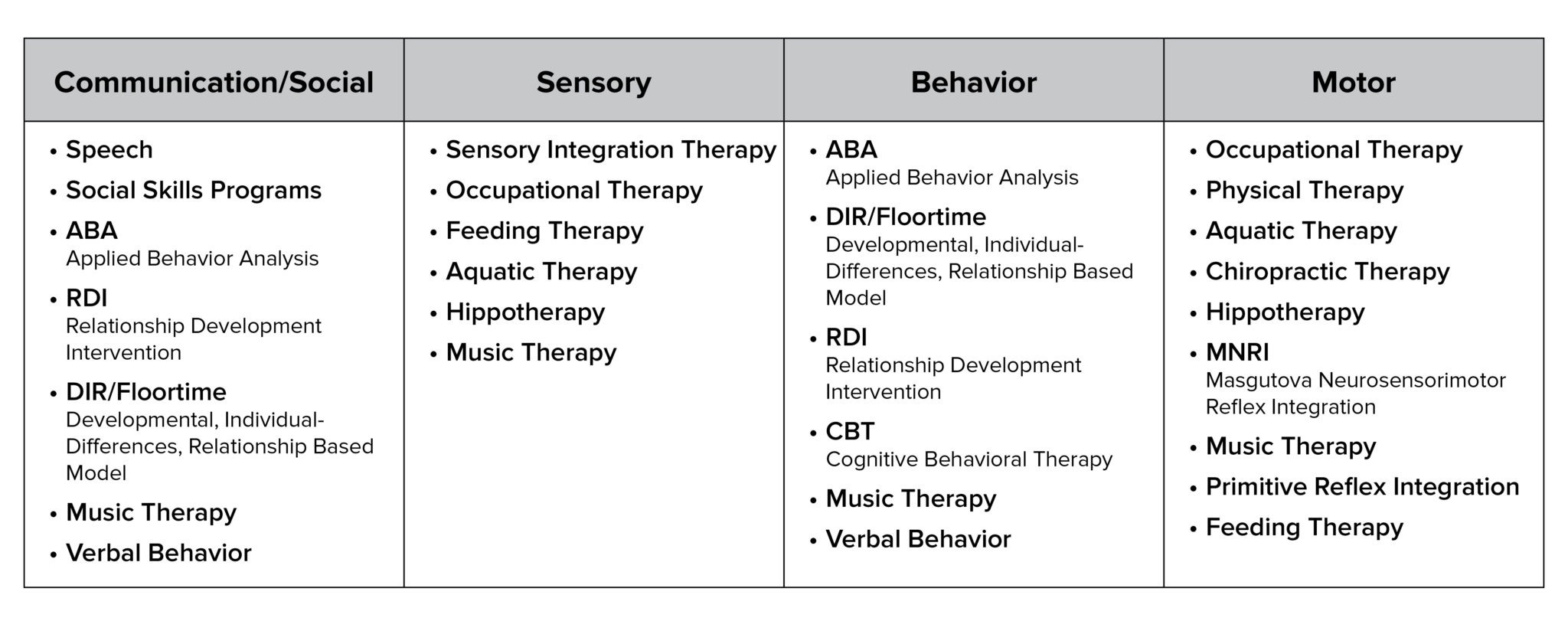Article of the Week
Top Reasons to Implement a GFCF Diet
Why does my child need a Gluten-Free, Casein-Free Diet? There are several reasons why parents should consider a gluten-free, casein-free…

All content of this article was created for informational purposes only and is not intended to be a substitute for professional advice, diagnosis, or treatment. Always seek the advice of your physician, therapist, or other qualified health provider with any questions or concerns you may have.
The most common therapeutic interventions for autism are occupational therapy, speech therapy, physical therapy, and Applied Behavior Analysis. When exploring therapeutic interventions for your child, there are many options to consider. Make a prioritized list of your child’s needs. Take into consideration your child’s strengths and learning style as well as family finances and values. Parents should do their research in order to find the therapeutic interventions that match your child’s unique needs.
Not every therapy or therapist will be a good fit for your child. There are good and bad professionals in every field. Talk to other families in your community for their recommendations. Interview the therapist. Request to observe sessions. Watch your child for warning signs of abuse or neglect. If you feel apprehensive, stop the therapy and re-evaluate. Read TACA’s article on Risk Reduction Strategies for Physical and Sexual Abuse to learn more.


Speech Therapy focuses on improving communication and feeding skills. This includes oral motor development, verbal language skills, augmentative and alternative communication modalities, social communication and feeding therapy. A speech language pathologist evaluates your child’s understanding of language, ability to communicate through non-verbal and verbal gestures, and your child’s ability to chew and swallow food and liquids to develop a treatment plan. Learn more about speech therapy here.
Providers:
Possible Funding Sources:
Occupational Therapy (OT) assists your child to perform activities of daily living (ADL), such as manipulating toys in play, handwriting, dressing, feeding, bathing, and working. An occupational therapist will evaluate your child’s trunk and upper body strength, joint range of motion, muscle tone, skin integrity, fine motor milestones, hand-eye coordination, manipulation of objects within their hands, sensory (sight, smell, hearing, touch, taste) awareness, and activities of daily living. The therapist, along with your input, will develop goals for your child and a plan of how to achieve these goals. Therapy sessions are typically geared towards functional activities that your child should be performing, such as playing, dressing, self-feeding, bathing, coloring, writing, craft projects, and work activities. Learn more about Occupational Therapy here.
Providers:
Possible Funding Sources:
Physical Therapy (PT) focuses on gross motor development including coordination, movement and balance, gait, motor imitation and play skills. Physical therapists work with adaptive equipment like braces, seating devices, wheelchairs, and specialized car seats. Learn more about Physical Therapy here.
Providers:
Possible Funding Sources:
There are a number of different behavioral therapies available, which can leave parents feeling confused about which approach to take. Below, you will find a brief overview of the most common behavior intervention programs for use as a starting point in determining whether or not behavior therapy is a good fit for your child and, if so, which approach best meets their individual learning style and needs.
Based on B.F. Skinner’s theory of Behaviorism, ABA therapy aims to improve adaptive learning skills, communication, and behavior through breaking down tasks into small steps, repetition, and reinforcement. ABA therapists train Register Behavior Technicians (RBTs) to implement your child’s treatment plan. Research-based evidence shows benefit from therapy when a child receives 20-40 hours of ABA therapy per week. ABA is the only therapeutic treatment for autism approved by the FDA.
Providers:
Possible Funding Source:

Below is a brief description of some other types of therapeutic interventions that are available. When considering which options may be a good fit for your child, it is important to remember that play and therapy are the work of a child with autism. A life with balance includes rest. Be sure your child’s schedule has plenty of free time to relax and participate in activities of their choice.
Physical therapy that takes place in a pool. Additional benefits to physical therapy performed in water include sensory stimulation from hydrostatic pressure, water resistance for strength training, and body awareness.
Providers:
Possible Funding Sources:
Misalignments of the spine, called subluxations, are manually corrected. This alleviates pressure on nerves and improves nervous system functioning. Specially trained chiropractors can evaluate for primitive reflex integration and provide nutritional guidance.
Providers:
Possible Funding Sources:
Cognitive Behavioral Therapists work with individuals and families to strengthen mental health, develop coping strategies, and improve emotional regulation. Common issues addressed are anxiety, depression, anger, eating disorders, and difficulty handling stress.
Providers:
Possible Funding Sources:
Evaluates and implements a treatment plan for feeding issues including; sucking, chewing, swallowing, gagging, and sensory defensiveness with food textures. A nutritionist or dietician may be consulted for nutritional advice.
Providers:
Possible Funding Sources:
Utilizes horses as a therapy tool for improved sensory, neuromotor, and cognitive development.
Providers:
Possible Funding Sources:
Specially trained professionals assess and create a treatment plan for primary motor reflex patterns and integration.
Providers:
Possible Funding Sources:
Uses music therapeutically to address behavior, communication, sensory, motor, self-regulation, and cognitive functioning.
Providers:
Possible Funding Sources:
Also referred to as EEG biofeedback; utilizes computer-based brain training to analyze and retrain the client’s brainwave activity to a more controlled pattern.
Provider:
Possible Funding Sources:
Professionals assess and develop treatment plans for retained primitive reflexes. Primitive reflexes are naturally present in infancy and disappear through normal development. Reflexes that do not integrate may contribute to developmental delay and sensory issues.
Providers:
Possible Funding Sources:
Specially trained occupational therapists expose people that have sensory processing issues to a variety of sensory stimuli and play-based activities in a structured, thoughtful way.
Provider:
Possible Funding Sources:
Teaches social skills through direct instruction and repetition. Professionals use a variety of techniques including role playing, Social Stories, social scripts, typical peers, or a standardized curriculum to promote social skill generation.
Providers:
Possible Funding Sources:
Based on the principles of ABA, Verbal Behavior teaches communication through connecting words to their function. Words are divided into four functions: echoics, mands, tacts, and intraverbals.
Providers:
Possible Funding Sources:
Why does my child need a Gluten-Free, Casein-Free Diet? There are several reasons why parents should consider a gluten-free, casein-free…
If your child is showing signs or symptoms of autism, it is important to have them screened. The sooner your child is…
Kids with autism can be extremely selective when it comes to eating. An estimated 46–89% of children with autism spectrum disorder…
Autism is a clinical diagnosis, which means there is no lab test to determine whether or not a person has…